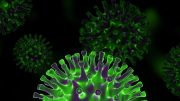
A study found the Oxford-AstraZeneca vaccine protection wanes after three months post-two doses.
The protection offered by the Oxford-Astra Zeneca COVID-19 vaccine declines after three months of receiving two doses, a study says.
The findings – drawn from datasets in two countries – suggest that booster programs are needed to help maintain protection from severe disease in those vaccinated with Oxford-Astra Zeneca, experts say.
Researchers from Scotland and Brazil analyzed data for two million people in Scotland and 42 million people in Brazil who had been vaccinated with the Oxford-Astra Zeneca vaccine.
In Scotland, when compared with two weeks after receiving a second dose, there was approximately a fivefold increase in the chance of being hospitalized or dying from COVID-19 nearly five months after being double vaccinated.
The decline in effectiveness begins to first appear at around three months, when the risk of hospitalization and death is double that of two weeks after the second dose, experts say.
The risk increases threefold just short of four months after the second vaccine dose. Similar numbers were seen for Brazil.
Researchers were able to compare data between Scotland and Brazil as they had a similar interval between doses – 12 weeks – and initial prioritization of who was vaccinated – people at highest risk of severe disease and healthcare workers.
The dominant variant was different in each country during the study period – Delta in Scotland and Gamma in Brazil – meaning the decline in effectiveness is likely because of vaccine waning and the impact of variants.
The study also estimated vaccine effectiveness at similar fortnightly intervals by comparing outcomes of people who have been jabbed with those who are unvaccinated.
But experts warned these figures should be treated with caution because it is becoming harder to compare unvaccinated people to vaccinated people with similar characteristics, particularly among older age groups where so many people are now vaccinated..
The study is part of the EAVE II project, which uses anonymized linked patient data in Scotland to track the pandemic and the vaccine roll out in real time.
The research team included scientists from the Universities of Edinburgh, Glasgow, Aberdeen, Strathclyde, and St Andrew’s; Public Health Scotland; Victoria University of Wellington; Fiocruz; Universidade do Estado do Rio de Janeiro and Universidade Federal de Bahia.
These findings have been published in The Lancet.
Professor Aziz Sheikh, Director of the University of Edinburgh’s Usher Institute and EAVE II study lead, said: “Vaccines have been a key tool in fighting the pandemic, but waning in their effectiveness has been a concern for a while. By identifying when waning first starts to occur in the Oxford-Astra Zeneca vaccine, it should be possible for governments to design booster programs that can ensure maximum protection is maintained.
“If eligible for a booster and you have not yet had one, I would highly recommend that you book one soon.”
Professor Vittal Katikireddi at the University of Glasgow said: “Our analyses of national datasets from both Scotland and Brazil suggest that there is considerable waning of effectiveness for the Oxford AstraZeneca vaccine, with protection against severe COVID-19 falling over time.
“We studied two million people in Scotland and over 42 million people in Brazil who had received two doses of the Oxford-AstraZeneca vaccine. More than four months after receiving a second dose, the risk of experiencing either a COVID-19 hospitalization or death was approximately five times greater than the period of maximum vaccine protection after accounting for changes in infection rates and a range of other factors.
“Our work highlights the importance of getting boosters, even if you’ve had two doses of the Oxford AstraZeneca vaccine, as soon as you are able to.”
The study was funded by the Medical Research Council, UK Research and Innovation Industrial Strategy Challenge Fund, the National Institute for Health Research and Health Data Research UK (HDR UK), and was supported by the Scottish Government.
Additional support was provided through the Scottish Government Director-General Health and Social Care, and the UKRI COVID-19 National Core Studies Data and Connectivity program led by HDR UK.
Professor Andrew Morris, Director of Health Data Research UK said, “This research is a great example of what can be achieved through global collaboration when it comes to the use of data for health research. By drawing on findings from data sets in two countries with differing dominant COVID-19 variants, the researchers have been able to disentangle vaccine waning from the effects of changes in variants – strengthening the evidence for the ongoing booster program.
“Health Data Research UK is pleased to have been able to support both the development of these data sets, and their harmonized analysis, as part of our mission to enable global and trustworthy sharing of data to allow major COVID-19 research questions to be addressed at pace.”
Reference: “Two-dose ChAdOx1 nCoV-19 vaccine protection against COVID-19 hospital admissions and deaths over time: a retrospective, population-based cohort study in Scotland and Brazil” by Prof Srinivasa Vittal Katikireddi, PhD; Thiago Cerqueira-Silva; Eleftheria Vasileiou, PhD; Prof Chris Robertson, PhD; Sarah Amele, PhD; Jiafeng Pan, PhD; Bob Taylor, PhD; Prof Viviane Boaventura, MD; Prof Guilherme Loureiro Werneck, PhD; Renzo Flores-Ortiz, PhD; Utkarsh Agrawal, PhD; Annemarie B Docherty, PhD; Prof Colin McCowan, PhD; Jim McMenamin, MBChB; Emily Moore, PhD; Prof Lewis D Ritchie, MD; Prof Igor Rudan, PhD; Syed Ahmar Shah, PhD; Ting Shi, PhD; Prof Colin R Simpson, PhD; Prof Mauricio L Barreto, MD; Vinicius de Araujo Oliveira, MD; Prof Manoel Barral-Netto, MD and Prof Aziz Sheikh, MD, 20 December 2021, The Lancet.
DOI: 10.1016/S0140-6736(21)02754-9









This decline in vaccine effectiveness illustrates that it’s not the protein spikes that should be attacked – it’s the virus itself.
All the coronaviruses and all their variants have different protein spikes, with Delta and Omicron having spikes that are more efficient at getting around the vaccines. But the real problem is in the virus itself, not its protein shell, and why the most dangerous (MERS, SARS, and Covid-19) are so infectious. My independent research has found multiple one-in-a-million nucleotide sequence matches between all the coronaviruses and the human genome. Those sequences are the same as some of the loops of human tRNA. Using those loops and their amino acid code matches, viruses may be able to fool the nucleus membrane in cells to allow the virus to enter and associate with the human DNA, creating more opportunities for further infection. Our immune system may be compromised and may no longer be able to stop the virus and other diseases from attacking organs throughout the body. Vaccines that attack the virus protein shells while ignoring their contents are doomed to failure from the Darwin effect, but recognizing these loops suggests a possible approach to successful coronavirus vaccines. Only the infection process is considered in my work, not the innate virulence of the virus. For more info, check out this YouTube, Coronavirus – Using Your DNA Against You. https://www.youtube.com/watch?v=8dOIzD6ch8s
While the MSM condemns the use of ivermectin, the most populated state in India just declared they are officially COVID free after promoting widespread use of the safe, proven medicine. In addition to this, Ivermectin attaches to covid spikes and prevents them from binding to ACE2 receptors. Get your Ivermectin while you still can https://medicalfreedom.wiki